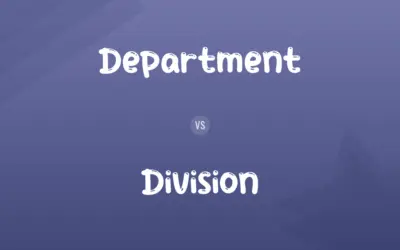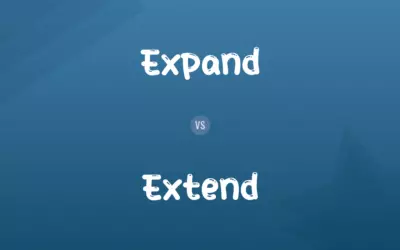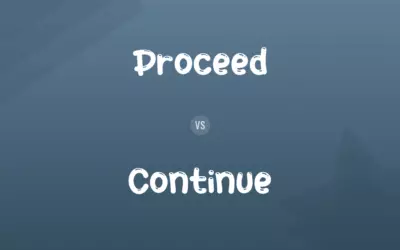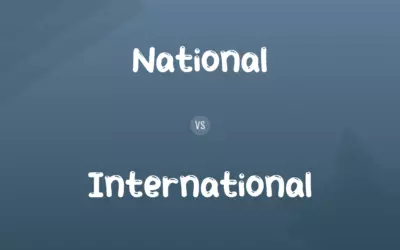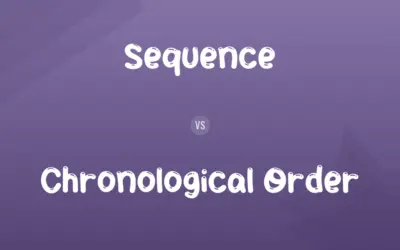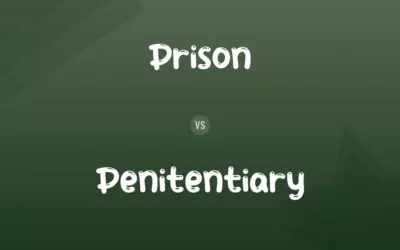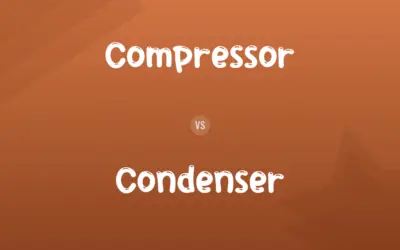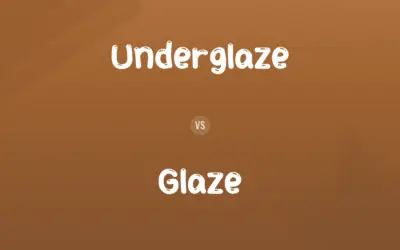Split System vs. Reverse Cycle: Difference and Comparison
Edited by Muazma Batool — By Muneeza Rehman — Published on March 16, 2024
A split system air conditioner provides cooling or heating (if equipped) for individual rooms, using separate indoor and outdoor units; a reverse cycle air conditioner can heat and cool by reversing its refrigeration cycle.
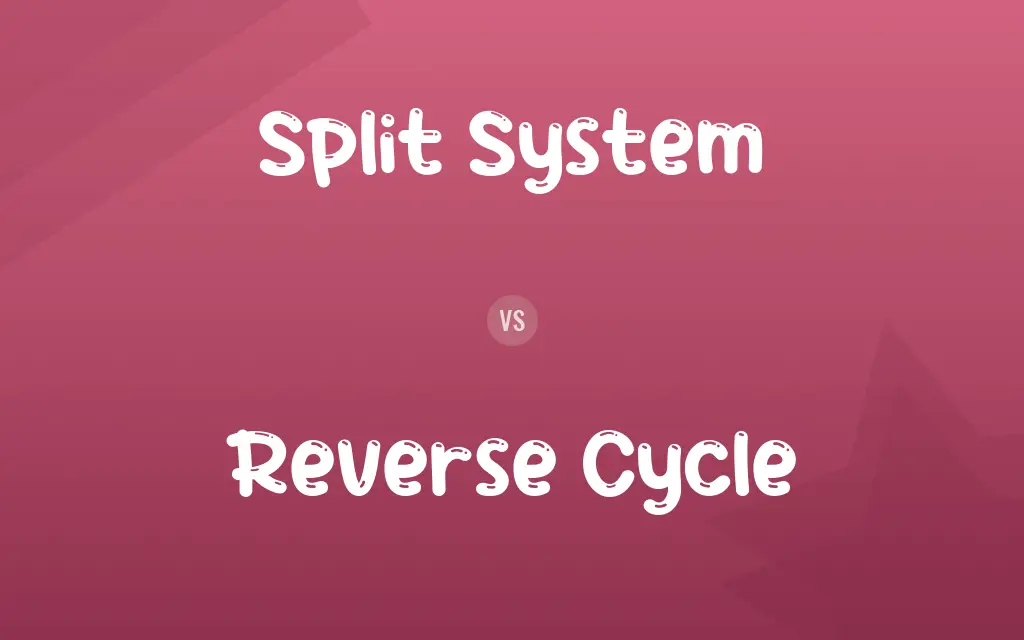
Difference Between Split System and Reverse Cycle
Split systems are a type of air conditioning that consists of two main parts: an outdoor unit and an indoor unit, connected by pipes carrying refrigerant. This design is efficient for cooling specific areas. Reverse cycle air conditioners, also known as heat pumps, use the same split system architecture but can reverse the refrigeration cycle to provide both cooling and heating, making them versatile for all seasons.
Muneeza Rehman
Mar 16, 2024
In terms of installation, both systems require an outdoor unit placement and an indoor unit installation. However, the reverse cycle's ability to heat and cool means it might be a more complex system overall, potentially influencing installation choices and costs.
Muneeza Rehman
Mar 16, 2024
Operationally, split systems in cooling mode work by removing heat from indoors and expelling it outside, whereas reverse cycle units can absorb heat from outside air to warm the interior, even in cold weather. This reversing capability is the key feature that distinguishes reverse cycle units.
Muneeza Rehman
Mar 16, 2024
Energy efficiency is a significant factor for both types. While split systems are generally efficient in cooling, reverse cycle systems are highly efficient in both heating and cooling modes due to their use of heat exchange technology, often making them more cost-effective in climates that require both functions.
Jonathan
Mar 16, 2024
The choice between the two often comes down to climate and heating needs. In areas where both heating and cooling are seasonal requirements, a reverse cycle system offers a comprehensive solution. In contrast, in regions with primarily warm climates and minimal heating needs, a simple split system may suffice.
Olivia
Mar 16, 2024
Split System vs. Reverse Cycle Comparison Chart
Functionality
Cooling primarily, heating if equipped
Both heating and cooling efficiently
Muneeza Rehman
Mar 16, 2024
Components
Outdoor unit and indoor unit
Same, with capability to reverse cycle
Muneeza Rehman
Mar 16, 2024
Energy Efficiency
High in cooling mode
High in both cooling and heating modes
Muneeza Rehman
Mar 16, 2024
Ideal Climate
Warm climates or where cooling is the main need
Regions requiring both efficient cooling and heating
Muneeza Rehman
Mar 16, 2024
Cost Effectiveness
Efficient for cooling only
More cost-effective for year-round climate control
Muneeza Rehman
Mar 16, 2024
Flexibility
Limited to cooling (or heating if equipped)
Flexible, providing comfort in all seasons
William
Mar 16, 2024
Split System vs. Reverse Cycle Definitions
◉Split System
Offers targeted cooling with separate temperature control.
The split system allows for different temperatures in each room.
Muneeza Rehman
Feb 22, 2024
◉Reverse Cycle
Also known as a heat pump, it extracts heat from the outside air to warm the interior.
The reverse cycle system efficiently heats the house even on cold days.
Muneeza Rehman
Feb 22, 2024
◉Split System
Requires minimal installation space, with flexible placement options.
The compact size of the split system made it easy to fit in my small apartment.
Muneeza Rehman
Feb 22, 2024
◉Reverse Cycle
Offers versatile climate control in a single system.
With a reverse cycle, you can switch between heating and cooling as needed.
Muneeza Rehman
Feb 22, 2024
◉Split System
Known for its quiet operation and energy efficiency.
I prefer a split system because it's quieter and saves on energy bills.
Muneeza Rehman
Feb 22, 2024
◉Reverse Cycle
An air conditioning system capable of both cooling and heating by reversing its refrigeration cycle.
Their reverse cycle unit keeps the house comfortable year-round.
Muneeza Rehman
Feb 22, 2024
◉Split System
An air conditioning system divided into two units, one indoor and one outdoor, for cooling specific areas.
They installed a split system in the living room for better comfort during summer.
Muneeza Rehman
Feb 22, 2024
◉Reverse Cycle
Highly energy-efficient, reducing overall heating and cooling costs.
The energy savings from our reverse cycle system were significant.
Muneeza Rehman
Feb 22, 2024
◉Split System
Can be equipped with heating capabilities in some models.
Their split system also heats, making it useful for chilly evenings.
Muneeza Rehman
Feb 22, 2024
◉Reverse Cycle
Ideal for climates with both hot summers and cold winters.
Living in a temperate climate, a reverse cycle air conditioner was the best choice for us.
Leo
Feb 22, 2024
Split System vs. Reverse Cycle Frequently Asked Questions
How do I decide between a split system and a reverse cycle?
Consider your climate and whether you need both heating and cooling. For year-round climate control, a reverse cycle is ideal. For primarily warm climates with occasional cooling needs, a split system may suffice.
Muneeza Rehman
Mar 16, 2024
Can a split system provide heating?
Yes, some split systems are designed with heating capabilities, but this is distinct from the reverse cycle's ability to switch between heating and cooling.
Muneeza Rehman
Mar 16, 2024
Which is more energy-efficient, split system or reverse cycle?
Reverse cycle systems are generally more energy-efficient for heating compared to traditional heating methods, and both are efficient for cooling.
Muneeza Rehman
Mar 16, 2024
Is a reverse cycle air conditioner more expensive than a split system?
Initially, reverse cycle systems may be more costly due to their dual functionality, but they can offer greater energy savings over time.
Muneeza Rehman
Mar 16, 2024
Can I install a reverse cycle unit in a cold climate?
Yes, reverse cycle systems are effective in cold climates as they can extract heat from the outside air efficiently down to certain temperatures.
Muneeza Rehman
Mar 16, 2024
Do both systems require professional installation?
Yes, professional installation is recommended for both types to ensure efficiency, safety, and compliance with local regulations.
Muneeza Rehman
Mar 16, 2024
How long do split system and reverse cycle air conditioners last?
With proper maintenance, both systems can last 15-20 years, though performance and efficiency may vary over time.
Henry
Mar 16, 2024
Are reverse cycle systems suitable for large homes?
Yes, reverse cycle systems can be scaled for large homes, often through multi-split systems allowing for different zones to be heated or cooled independently.
Jonathan
Mar 16, 2024
Can I use a reverse cycle system for cooling only?
Absolutely, you can use a reverse cycle system in cooling mode only during warmer months, with the option to switch to heating when needed.
Nolan
Mar 16, 2024
What maintenance do these systems require?
Both systems require regular cleaning of filters and checks of refrigerant levels to operate efficiently, with professional servicing recommended annually.
Leo
Mar 16, 2024
Content Creators
Written by
Muneeza RehmanAt Comparisons.wiki, Muneeza skillfully navigates the vast sea of information, ensuring clarity and accuracy as the lead content editor. With a keen eye for detail, she curates every comparison to enlighten and engage readers.
Edited by
Muazma BatoolAs a content editor, Muazma Batool is not just a grammar guru but a creative mastermind who breathes life into every word. With an eagle eye for detail and a passion for storytelling, she transforms bland text into engaging content that captivates audiences and drives results.





